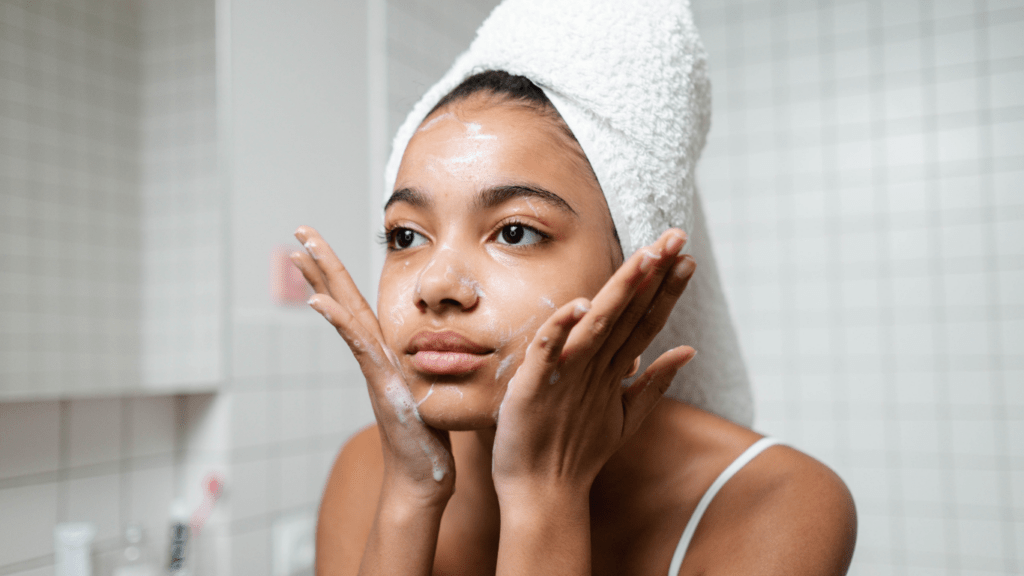Understanding Your Skin Type
Knowing your skin type is crucial for crafting an effective skincare routine. Different skin types respond differently to products and treatments.
Identifying Different Skin Types
Skin types generally fall into five categories. Here are the characteristics:
- Normal Skin: Balanced, neither too oily nor too dry. Few imperfections.
- Dry Skin: Flaky, rough texture, visible lines. Tighter feel.
- Oily Skin: Shiny, greasy texture, enlarged pores. Prone to breakouts.
- Combination Skin: Oily in T-zone, dry or normal in other areas. Mixed traits.
- Sensitive Skin: Easily irritated, redness, itching. Reacts quickly to products.
Why Skin Type Matters
Skin type influences product effectiveness and skincare routine success. Using products suited to your skin type prevents issues like irritation and inefficacy. For example, oily skin benefits from non-comedogenic, oil-free products, while dry skin needs rich, hydrating products.
Understanding your skin type helps make informed decisions when selecting products, ensuring optimal results and maintaining healthy, glowing skin.
Daily Skincare Routine

Establishing a daily skincare routine supports healthy, glowing skin. Each step targets specific skin needs and enhances overall skin health.
Cleansing
Cleansing removes dirt, oil, and makeup that can clog pores. I use a gentle, sulfate-free cleanser to avoid stripping my skin of natural oils. Normal and combination skin types benefit from gel or foam cleansers. Dry skin prefers cream-based cleansers that add moisture, while oily skin reacts best to foaming cleansers that control excess oil. Cleanse twice daily, in the morning and evening, for best results.
Toning
Toning helps balance skin and prepare it for further treatments. I select an alcohol-free toner to avoid irritation. Hydrating toners work well for dry or sensitive skin, providing moisture and calming properties. Astringent toners fit oily or acne-prone skin, helping to remove excess oil. Apply toner using a cotton pad or by gently patting it into the skin. Including this step ensures your pores are refined and your skin’s pH balance is restored.
Moisturizing
Moisturizing keeps skin soft and hydrated. I choose a moisturizer based on my skin type to ensure the best results. Lightweight, non-comedogenic formulas suit oily or combination skin, preventing breakouts. Rich, hydrating creams are ideal for dry skin, offering intensive moisture. Normal skin benefits from balanced lotions. Apply moisturizer twice a day to keep skin hydrated and create a barrier against environmental toxins.
Sun Protection
Sun protection is vital for preventing sun damage and premature aging. I always apply a broad-spectrum sunscreen with SPF 30 or higher. Chemical sunscreens absorb UV rays, while physical sunscreens, like those with zinc oxide, reflect them. Apply sunscreen 15 minutes before sun exposure and reapply every two hours if outdoors. Using sun protection daily protects skin from harmful UV rays, and it’s essential for maintaining healthy, glowing skin.
Dietary Tips for Healthy Skin
Maintaining a balanced diet plays a crucial role in skin health. Incorporating specific foods can enhance your skin’s appearance, making it radiant and glowing.
Hydration
Proper hydration is essential for skin elasticity and moisture balance. Drinking at least eight 8-ounce glasses of water daily helps keep the skin hydrated from within. Herbal teas and water-rich foods like cucumbers, oranges, and watermelon also contribute to hydration.
Foods Rich in Antioxidants
Antioxidant-rich foods help protect the skin from damage caused by free radicals. Include berries, such as blueberries, strawberries, and blackberries, in your diet. Dark chocolate, pecans, and artichokes are also excellent sources. Antioxidants combat oxidative stress, reducing signs of aging and promoting a youthful glow.
Vitamins and Minerals
Vitamins and minerals support skin strength and repair. Vitamin C, found in citrus fruits like oranges and lemons, aids collagen production. Vitamin E, in nuts and seeds such as almonds and sunflower seeds, provides moisturizing benefits. Zinc, available in shellfish and legumes, helps with inflammation and acne prevention. Each of these nutrients plays a specific role in maintaining healthy, glowing skin.
Lifestyle Changes
Making specific lifestyle changes can significantly improve your skin’s health and glow. Let’s explore some key areas to focus on.
Adequate Sleep
Quality sleep gives your skin time to repair and regenerate. Aim for 7-9 hours of sleep per night to allow for proper cellular turnover and the reduction of dark circles. An optimal sleep environment, such as a cool, dark room, improves sleep quality. Consider using silk pillowcases to reduce skin creases and irritation.
Stress Management
Managing stress keeps your skin from experiencing negative effects like breakouts and dullness. Practice relaxation techniques like meditation or deep breathing exercises to maintain skin health. Engaging in hobbies or regular activities that you enjoy helps keep stress levels low. Limit caffeine and alcohol intake as they can increase anxiety and affect your skin.
Regular Exercise
Consistent exercise boosts circulation, delivering oxygen and nutrients to your skin. Aim for at least 30 minutes of moderate exercise daily to keep your skin glowing. Activities like jogging, yoga, or swimming enhance blood flow and promote detoxification through sweat. Remember to cleanse your skin post-workout to remove excess oil and prevent breakouts.
Home Remedies and Natural Treatments
Natural ingredients often offer effective and gentle solutions for skin health. Here are some powerful remedies that can enhance your skin’s glow and vitality.
DIY Masks
DIY masks use everyday ingredients to nourish the skin. For hydration, mix honey and yogurt. Honey boasts anti-inflammatory properties and yogurt contains lactic acid, which exfoliates dead skin cells. For a glowing complexion, create a mask with turmeric and plain Greek yogurt. Turmeric has antioxidant properties and yogurt adds moisture.
Essential Oils
Essential oils can significantly improve skin health due to their concentrated nature. Tea tree oil is effective for acne-prone skin; it reduces inflammation and fights bacteria. Lavender oil soothes irritated skin. Dilute essential oils in a carrier oil, such as jojoba or almond, to avoid skin irritation.
Common Skincare Mistakes to Avoid
Many overlook essential steps or overdo products, leading to adverse effects. Here are common mistakes to steer clear of.
Over-Exfoliation
Regular exfoliation helps remove dead skin cells, but overdoing it harms the skin’s barrier. Using mechanical scrubs or chemical exfoliants more than three times weekly can cause redness, dryness, and irritation. I recommend sticking to a gentle exfoliant and limiting use to 1-2 times per week. For instance, using a salicylic acid-based exfoliant can keep pores clear without causing harm.
Ignoring Patch Tests
Before trying new skincare products, patch tests are crucial. Failing to test can lead to allergic reactions or irritation. Apply a small amount of the product on your inner forearm or behind the ear and wait 24-48 hours. If no irritation occurs, it’s usually safe for your face. For instance, when using a new serum or mask, always perform a patch test to ensure compatibility.


 Creative Director at Divine Glamour Trail, is the visionary behind the platform, which is dedicated to bringing readers the latest trends in hairstyles, beauty, and skincare. With a passion for timeless fashion and expert style guidance, George provides tips, secrets, and updates that empower individuals to enhance their personal style. His platform is a go-to source for anyone looking to stay ahead in the fashion game, combining modern trends with timeless elegance to help readers feel confident and look their best.
Creative Director at Divine Glamour Trail, is the visionary behind the platform, which is dedicated to bringing readers the latest trends in hairstyles, beauty, and skincare. With a passion for timeless fashion and expert style guidance, George provides tips, secrets, and updates that empower individuals to enhance their personal style. His platform is a go-to source for anyone looking to stay ahead in the fashion game, combining modern trends with timeless elegance to help readers feel confident and look their best.
